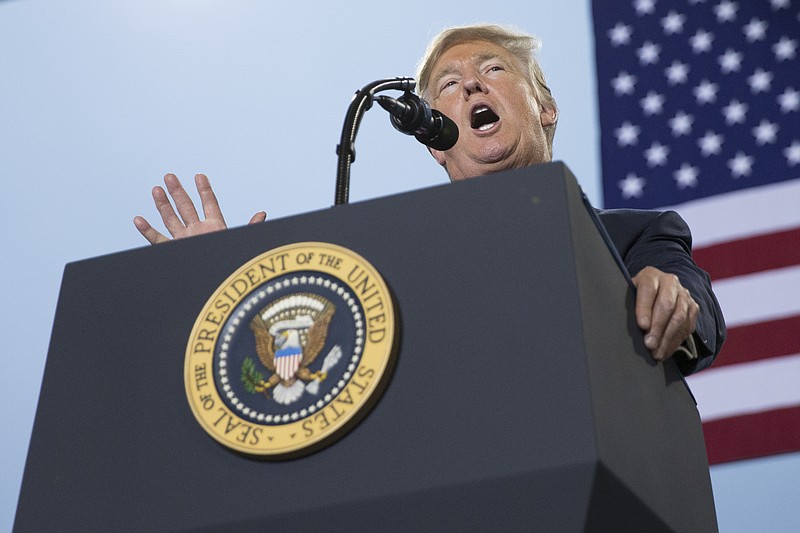The separation of church and state may come down to a separation of church and political PACs.
Which may come down to a separation of church and taxes.
Who knew that either religion or tax reform was so complicated?
Politicians know. And now, with tax cuts being two out of every five words spoken in or about Washington, D.C., some lawmakers - read here, Republicans - want to make the repeal of a six-decade-old law that prohibits churches from endorsing or opposing political candidates part of their shadowy tax bill, a bill that still is being "hammered out."
"Republicans Want to Kill Johnson Amendment," is the topic line of a news release from Public Citizen, a nonprofit, nonpartisan government watchdog group that last week joined religious organizations and civic groups urging congressional leaders to keep politics out of the pulpit by opposing any such repeal.
The Johnson Amendment already is weaker than it was in 1954 when the bill proposed by then-Sen. Lyndon B. Johnson was passed without controversy by a Republican Congress and signed into law by a Republican president.
In May, Donald Trump - who has vowed to "destroy" the Johnson Amendment - signed an executive order easing restrictions, or at least discouraging enforcement, of the law. Until then, the amendment's prohibition of charities, universities and churches from participating in politics had been supported and strengthened for decades on a bipartisan basis by administrations of both political parties.
But we all the know the stranglehold that religion - particularly today's evangelical religious right - now seems to have on our politics. It is in great measure the muscle behind the GOP health care group-think that increasingly wants to control women's bodies with religious and political rules, for example.
So just imagine the potential growth of church-fueled dark money and political PACs if churches can further confuse freedom of religion with freedom of speech.
Yes, it is complicated.
The Johnson Amendment was and is about tax status, not free speech. Houses of worship can endorse candidates, but they must give up their tax-exempt status to do so.
The Johnson Amendment's intent is to help keep our country in step with the First Amendment of our Constitution - freedom of religion and freedom from our government imposing a religion - along with Thomas Jefferson's supporting policy that we maintain a wall of separation between church and state.
Tax exemption - maintained or lost depending on the churches' adherence to the Johnson Amendment - helps provide that wall.
The tradition of churches being tax-exempt in America dates back to the time of the American Revolution when nine of the original 13 colonies were giving some kind of tax relief to churches. (Before that, the tax exempt idea can be traced back to Roman times when Emperor Constantine in the 4th century granted the Christian church a complete exemption from all forms of taxation, according to CQ Researcher.)
Knitted together, the trifecta of the First Amendment, Jefferson's wall of separation policy and the Johnson Amendment means the government cannot make laws that favor one religion over any other because it cannot make laws related to the establishment of a religion or the free expression of religious beliefs.
In other words, you and I and our children can pray in school, but public schools cannot require us to pray. And the government cannot endorse any particular religion - which is why there should be no copies of the Ten Commandments in front of schools or courthouses, nor any Buddha statues (or nativity scenes) in front of City Hall.
But Trump's order in May - and the spectre of fully repealing the Johnson Amendment (which only Congress can do) - would seem to fling open church doors to invite political meddling, along with more dark money into politics. Without the Johnson Amendment, imagine the folks who would contribute to a church PAC knowing that because the church still has tax-exempt status their names and contributions would not be reported. Plus the donor could claim a deduction on the "church" contribution. What a bonanza.
All this makes the question of churches being completely tax exempt a very ripe topic, especially if tax code changes do away with the Johnson Amendment.
Churches already are paying little attention to the Johnson Amendment restrictions. Did you hear anyone in federal authority tell Franklin Graham, president and CEO of the Billy Graham Evangelistic Association and Samaritan's Purse, to stand down when he publicly endorsed Trump? The New York Times has reported that only one church is known to have ever lost its tax-exempt status for partisan politicking. That was in 1995 when The Church at Pierce Creek in Conklin, N.Y., lost its tax-exempt status after warning Christians against voting for Bill Clinton for president.
But if churches everywhere were to lose their tax-exempt status, politicking might become a tougher decision for them.
Think of the boon we'd suddenly have to the treasury: A 2012 University of Tampa study conservatively estimated the yearly cost of taxpayer religious subsidies - er, church tax exemptions - at $71 billion. That would pay for a lot of health care, disaster relief and homeland security, huh?
If tax reform guts the Johnson Amendment, it also should take away blanket church tax exemption.
We suspect that if churches and clergy are given a choice of whether they can play politics or stay on the public dole of tax exemption, the question might resolve itself pretty quickly.
